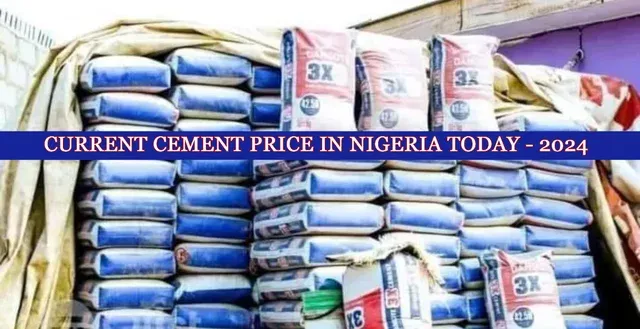THE PRICE OF CEMENT SKYROCKET
Cement Prices in Nigeria Today : Cost Per Bag for Dangote, BUA – 3rd March 2024
As Nigeria's construction sector experiences a notable surge, the demand for cement, a vital ingredient in building projects, has seen a corresponding increase.
This article seeks to offer a comprehensive overview of cement prices across Nigeria in 2024, explore the array of brands available in the market, and address common inquiries regarding cement usage in construction endeavors.
Factors Influencing Cement Prices
The pricing of cement in Nigeria is subject to various factors including production expenses, transportation costs, and market demand.
Moreover, fluctuations in global energy prices can impact production costs, subsequently affecting retail prices.
Price Disparities Across Nigeria
Cement prices exhibit significant variations across different regions of Nigeria. Factors like proximity to cement manufacturing facilities, logistical challenges in transportation, and local tax regulations contribute to these disparities.
Prominent Cement Brands in Nigeria
Dangote Cement
Dangote Cement stands as one of Nigeria’s foremost cement producers, recognized for its quality and durability.
As of 2024, prices for Dangote Cement range between N11,000 to N12,500 per bag, contingent on market dynamics and location.
Bua Cement
Another notable player in Nigeria's cement market is Bua Cement, offering competitive prices ranging from N10,000 to N11,000 per bag. Pricing variations are influenced by geographical location and market conditions.
Pop Cement
Pop or plaster of Paris cement is extensively used for interior décor and finishing. Prices for pop cement variants like ABS POP Cement and AZ MOULDA hover around N8,800 and N8,500 per 40kg bag, respectively.
Cement Pricing Landscape in 2024
Average Price of a Bag of Cement
On average, a bag of cement in Nigeria is priced at approximately N11,000 in 2024. Nonetheless, this pricing is subject to fluctuations owing to market dynamics.
Specific Brands Pricing
Insights into Construction
Cement Requirement for a 3-Bedroom House
Constructing a 3-bedroom house in Nigeria typically necessitates between 400 to 600 bags of cement, contingent on factors such as design intricacies, size, and structural specifications.
Buying cement in bulk often proves more cost-effective than purchasing smaller quantities. Bulk orders typically come with discounts and lower transportation costs per unit.
However, it's crucial to give thought to proper storage conditions to prevent the cement from becoming damp or contaminated, which can compromise its quality.
Ensuring Proper Cement Storage to Minimize Waste
Maintaining the quality of cement is paramount to prevent wastage. Here's how to store cement properly:
Dry Storage Area: Cement should be kept in a dry environment to prevent moisture absorption, which can lead to clumping and reduced effectiveness. Avoid storing it in areas prone to humidity or water leakage.
Elevated Storage: Store cement off the ground to prevent direct contact with moisture. Elevated storage helps safeguard against damp floors and potential water seepage.
Covering with Waterproof Sheets: Covering the cement with waterproof sheets provides an additional layer of protection against moisture. This precaution is particularly crucial during rainy seasons or in areas with high humidity levels.
Bag Stacking on Wooden Pallets: If storing cement in bags, stack them on wooden pallets to create airflow beneath the bags. This practice aids in ventilation and prevents the accumulation of moisture underneath the bags.
Keep Away from Walls: Avoid placing cement bags directly against walls to allow adequate air circulation. Adequate ventilation helps mitigate the risk of moisture buildup and mold growth.
Rotation of Stock: Cement has a shelf life, so it's advisable to use older stocks first to prevent expiration. Regularly rotate the stock to ensure that older batches are utilized before newer ones.
Check for Signs of Deterioration: Before use, inspect the cement for any signs of lump formation or deterioration. Discard any compromised batches to maintain the quality of your construction projects.
By adhering to these storage guidelines, you can effectively preserve the quality of cement, minimize waste, and ensure optimal performance in your construction endeavors.
Watch the video short below
